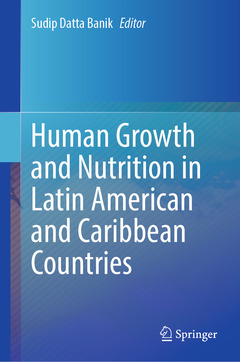Human Growth and Nutrition in Latin American and Caribbean Countries, 1st ed. 2023
Coordonnateur : Datta Banik Sudip

This book analyzes biological and sociocultural factors that influence nutritional status, physical growth, development and maturation of children and adolescents in Latin American and Caribbean (LAC) countries in the perspective of human ecology. Chapters in this book bring together both theoretical and empirical studies that take into account human biological and environmental conditions to understand how ethnic diversity, culturally determined lifestyle and dietary habits influence biological variation of human growth and nutrition in nine LAC countries: Argentina, Brazil, Chile, Cuba, Dominican Republic, El Salvador, Guatemala, Mexico, and Peru.
The book is divided into three sections. Chapters in the first section analyze nutritional and epidemiological aspects of child growth in the region. Articles in the second section focus on methods to evaluate human growth, development, and maturation. Finally, the third section brings together a series of studies representing different LAC countries, analyzing biocultural impacts on child growth and nutrition. By bringing together studies about the relationship between human biology, cultural diversity, nutrition and health in a region with huge environmental challenges, this volume addresses many of the challenges to achieve the United Nation?s Sustainable Development Goals 2 (Zero Hunger) and 3 (Good Health and Well-Being). Chapters in this volume present and discuss data on the effects of malnutrition on children's and adolescent's health and development, such as chronic undernutrition or stunting (growth deficit) and excess weight (overweight and obesity) as the risk factors for child morbidity and mortality m due to non-communicable diseases.
Human Growth and Nutrition in Latin American and Caribbean Countries will be a valuable resource for both students and researchers in different disciplines dedicated to the interdisciplinary research on the intersection between human biology, cultural diversity, nutrition and health. It will also be a useful source of information for both health professionals and policy makers developing and implementing interventions and public policies to achieve UN?s SDGs 2 and 3, particularly in the LAC regions.
- Evolutionary perspectives on child growth and nutrition. The complex relationship between food insecurity and malnutrition. Globalization, diet, and child health in three Latin American indigenous populations. Tuberculosis in children: a perspective from life history theory.
- Non-nutritional components in the diet.
- Reference curves of growth from Colombian National Surveys and anthropometric secular trends.
- Anthropometric indices for assessing nutritional status and health risk of schoolchildren and adolescents.
- The Extent of Residual Lower-Extremity Shortening in the Origins of Endemic Stunting among Guatemala Preschoolers: A photographic Examination. Evaluation of maturation among adolescent athletes.
- Secular trend in growth and nutritional status in Argentina over the last three decades.
- Changes in nutritional status and urbanization in a northeastern Patagonian city. A brief secular trend story of the school children from Puerto Madryn (Chubut, Argentina).
- Inequalities in malnutrition and living conditions of children from native and migrant families residing in the productive belt of La Plata city in Buenos Aires, Argentina.
- Growth and Nutrition Indicators in Brazil: Some perspectives and changes from 1975 to 2019.
- Obesity in Chilean schoolchildren and the importance of the diagnostic criteria: body mass index, body fat percentage, and biotype. Growth, body composition, and some influential factors in infants, children and adolescents of Cuba.
- Height, weight, and body mass index in El Salvadoran schoolchildren from the Bajo Lempa rural region.
- Measuring the impact of stunting on child growth considering ontogeny and sexual dimorphism.
- Consequences of increased dependence on store foods on seasonal macronutrient intake and gut microbiota in Maya mothers and their 12- to 36-month-old children..
- Parasitic infection, obesity, and micronutrient deficiencies in school-aged children in Mexico.
- Biological and ecological impacts on recovery from anemia among peri-urban Peruvian children.
Dr. Sudip Datta Banik is the Head of the Department of Human Ecology at the Center for Research and Advanced Studies of the National Polytechnic Institute (Cinvestav-IPN in Spanish acronym) in Merida, Mexico, where he works since 2013. He was a Reader of Anthropology at Vidyasagar University in West Bengal, India, and was associated with the University (undergraduate and postgraduate Departments) from 1998 to 2012. Dr. Datta Banik is a Biological Anthropologist, a graduate from the University of Calcutta. A certified researcher of the National System of Researcher (SNI, Level 2) of the Mexican National Council of Science and Technology since 2011. He is a Fellow of Human Biology Association, U.S.A. His major professional interest includes child growth, health and nutrition, obesity and metabolic syndrome, sports nutrition. He has published more than 100 scientific articles in peer-reviewed journals and book chapters in edited volumes. Publications include four (04) edited volumes. He has supervised theses at doctoral (4) and master’s (25) degree levels. Dr. Datta Banik acted as principal investigator in the research projects sponsored by several agencies in India and Mexico.
Analyzes biocultural factors that shape growth and nutrition of children, youth in Latin America and the Caribbean
Presents studies on child and youth nutrition, development and health from the perspective of human ecology
Will be useful for researchers, governments and NGOs working with child health and nutritional surveillance
Date de parution : 07-2023
Ouvrage de 423 p.
15.5x23.5 cm
Disponible chez l'éditeur (délai d'approvisionnement : 15 jours).
Prix indicatif 158,24 €
Ajouter au panier


